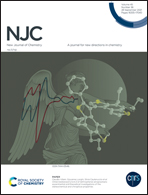Synthesis of papain–polyacrylamide hydrogel microspheres and their catalytic application†
Abstract
Although immobilized enzyme technologies effectively improve the reusability and stability of an enzyme, the introduction of covalent bonds or/and charge interaction causes the change for the secondary structure of an enzyme, thereby reducing the catalytic activity. In this work, a mild and efficient strategy for enzyme immobilization is proposed. A size-controlled hydrogel microsphere was designed and synthesized as an immobilized enzyme carrier. Papain was immobilized on the surface and pores of hydrogel microspheres by hydrogen bonding interactions, which have no adverse effect on the secondary structure of an enzyme. The activity of the papain–polyacrylamide hydrogel microsphere was 106.41% of that of free papain. In addition, the immobilized papain maintained 59.60% of free papain activity after 10 cycles. The results of practical catalytic application proved that the obtained papain–polyacrylamide hydrogel microspheres were very suitable for catalytic hydrolysis of allergen protein in cow's milk without introducing any other hetero protein.



 Please wait while we load your content...
Please wait while we load your content...